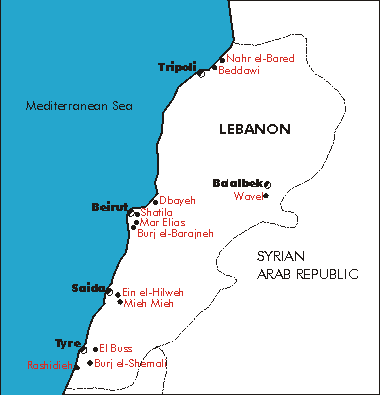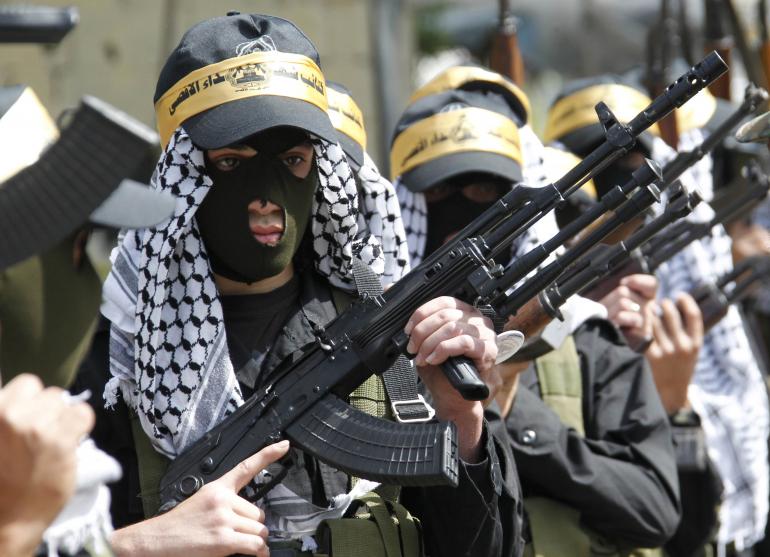 Lebanese officials handed over to Azzam al-Ahmad, aide to Palestinian Authority President Mahmoud Abbas, a list of wanted fugitives who had taken refuge at the Palestinian refugee camp of Ein el-Hilweh, according to Lebanese media reprts.
Lebanese officials handed over to Azzam al-Ahmad, aide to Palestinian Authority President Mahmoud Abbas, a list of wanted fugitives who had taken refuge at the Palestinian refugee camp of Ein el-Hilweh, according to Lebanese media reprts.
Several terrorists wanted for involvement in confrontations with the Lebanese army are hiding in the camp, according to the reports
Palestinian sources said in comments published in al-Joumhouria newspaper that once the security committee at the camp receives the list it take the appropriate actions to preserve stability at the camp and avert any attempt to involve it in Lebanon’s internal affairs.
Al-Ahmad arrived in Lebanon on Monday and met with senior Lebanese officials including Speaker Nabih Berri, Prime Minister Tammam Salam and General Security chief Maj. Gen. Abbas Ibrahim.
Fatah Movement Commander in Lebanon Maj. Gen. Munir al-Maqdah revealed that there is a good chance that Islamist fugitive Shadi al-Mawlawi is hiding at Ein el-Hilweh, pointing out that his accomplice Osama Mansour is nowhere to be found.
“There is a 90 percent chance that Mawlawi is at the camp, but information on Mansour is still unconfirmed,” Maqdah said in comments to al-Joumhouria.
The Palestinian official stressed that Fatah “has a duty inside Ein el-Hilweh to prevent any attempts to turn it into a safe haven for fugitives or assailants who are posing threat on security.”
“We have no knowledge about the role of some sides at the camp regarding aiding the suicide bombers of (Tripoli’s) Jabal Mohsen neighborhood,” Maqdah stressed in reference to the Tripoli twin suicide bombing that targeted the Omran cafe in the mostly Alawite neighborhood of Jabal Mohsen .
On Tuesday, the military prosecutor charged 28 people over the Jabal Mohsen attack, including top Islamist fugitives Mansour and Mawlawi — who are both still on the run.
Media reports said that several fugitives, including Salafist cleric Ahmed al-Asir, salafist-turned singer Fadel Shaker, Mawlawi and Mansour, have fled to Ein el-Hilweh and are running cells that are planning attacks against Lebanese interests.
General Security chief Maj. Gen. Abbas Ibrahim stressed on Thursday the necessity to stop terrorists from hiding in the Palestinian refugee camp of Ein el-Hilweh.
Ibrahim accused the residents of Ein el-Hilweh of turning the shantytown into a safe haven for outlaws.
If the Palestinians “can’t hand the terrorists over to the (Lebanese) authorities … then at least they could stop them from seeking refuge in the the camp and turning it into their hiding place,” said Ibrahim
“I know that they have the ability to prevent them (the outlaws) from entering” Ein el-Hilweh, he added.
Al-Akhbar newspaper reported on Thursday that that several members linked to the Islamic State group are currently taking the Palestinian refugee camp of Ein el-Hilweh as their hideout.

Ein al-Hilweh is the largest Palestinian refugee camp in Lebanon with over 70,000 Palestinian refugees and their descendants, swelled to nearly 120,000, as a result of influx of refugees from Syria since 2011. The camp is located near the port city of Sidon in south Lebanon.
Ein el-Hillweh was established in 1948 by the International Committee of the Red Cross to accommodate refugees from northern Palestine. Because Lebanese Armed Forces are not allowed to enter the camp Ein al-Hilweh has been called a “zone of unlaw” by the Lebanese media. Many people wanted by the Lebanese government are believed to have taken refuge in the camp as a result of the lack of Lebanese authority.
The reason the Lebanese Armed Forces are not allowed to enter the camp Ein al-Hilweh goes back to 1969 agreement between Yassir Arafat and the Lebanese army commander General Emile Bustani.. Egyptian president Gamal Abdel Nasser helped to broker the deal.
Under the agreement which was never published the 16 official Palestinian camps in Lebanon were removed from the stern jurisdiction of the Lebanese army and placed under the authority of the Palestinian Armed Struggle Command. Although the camps remained under Lebanese sovereignty the new arrangements meant that, after 1969, they became a key popular base for the PLO.

Leave a Reply
You must be logged in to post a comment.